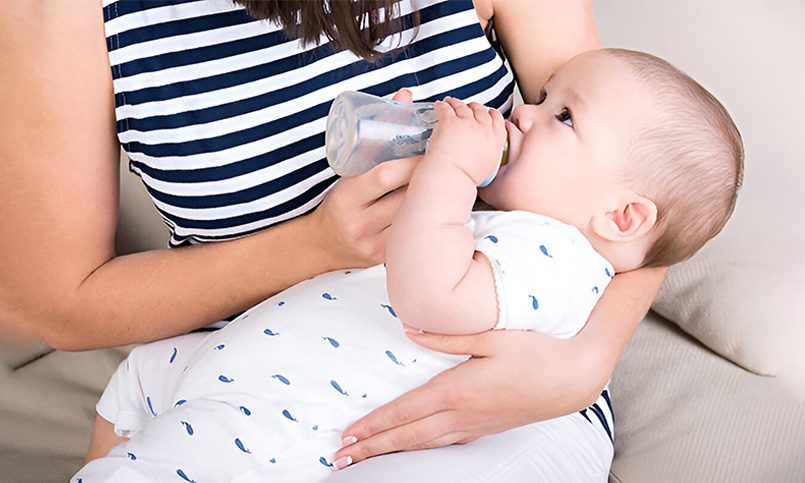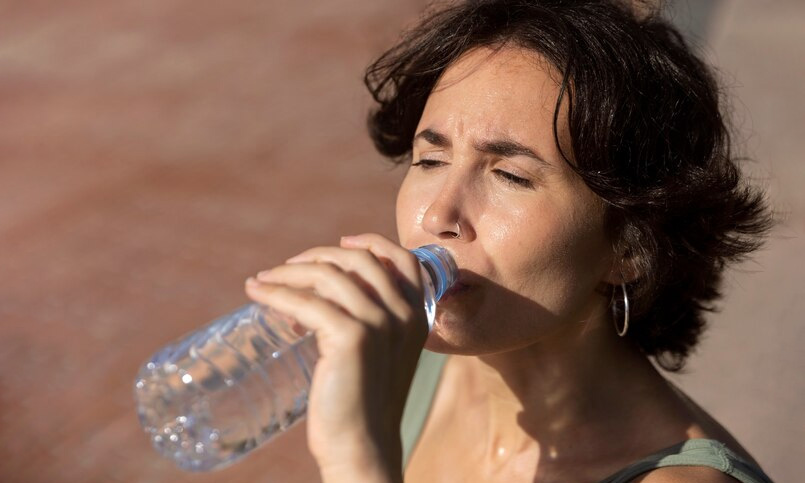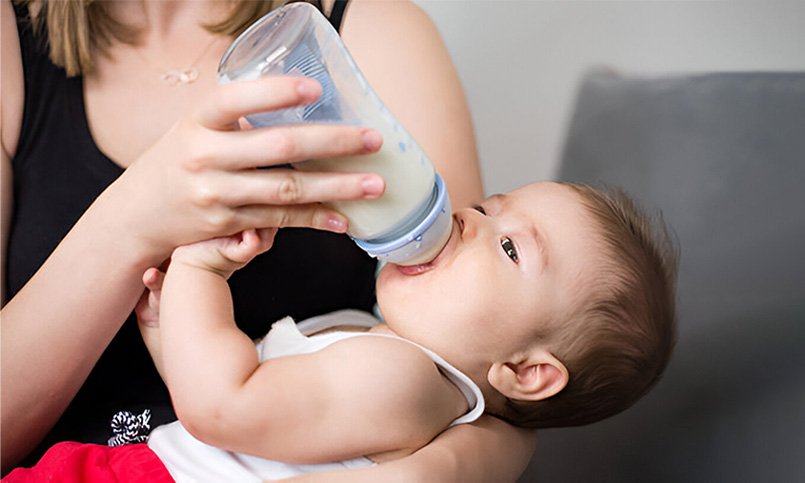Breastfeeding is a beautiful and natural process that nourishes your little one while creating an unbreakable bond between mother and child. However, it’s a demanding task that requires adequate hydration for both you and your baby. Staying properly hydrated is crucial during this phase as it supports milk production, prevents dehydration, and ensures your overall well-being.
Today here in this detailed guide, we are going to talk about the importance of water intake while breastfeeding, recommended amounts, signs of dehydration, and practical tips to help you stay hydrated throughout your breastfeeding journey.

Why Hydration Matters for Breastfeeding Mothers?
Breastfeeding is a water-intensive process, and maintaining proper hydration levels is essential for several reasons:
- Milk Production: Breast milk is primarily composed of water, and dehydration can lead to a decrease in milk supply. Adequate water intake helps support healthy milk production.
- Nutrient Transfer: Water facilitates the transfer of essential nutrients from your body to your breast milk, ensuring your baby receives the necessary nourishment.
- Energy Levels: Breastfeeding demands a significant amount of energy, and staying hydrated can help combat fatigue and maintain your overall well-being.
- Preventing Complications: Dehydration can increase the risk of complications such as urinary tract infections, constipation, and headaches, which can interfere with your ability to care for your baby effectively.
Signs of Dehydration
Recognizing the signs of dehydration is essential to prevent potential complications. Here are some common indicators that you may need to increase your water intake:
- Dark yellow urine: Urine color is a good indicator of hydration levels. Aim for pale yellow or almost clear urine.
- Dry mouth and lips: A persistent feeling of dryness in your mouth or cracked lips can be a sign of dehydration.
- Fatigue and headaches: Dehydration can lead to tiredness, lethargy, and persistent headaches.
- Constipation: Lack of adequate water can contribute to constipation and difficulty passing stools.
- Decreased milk supply: Dehydration may cause a temporary drop in your breast milk production.
If you experience any of these symptoms, increase your water intake immediately and consult your healthcare provider if the symptoms persist.
Tips for Staying Hydrated
Staying hydrated while breastfeeding can be challenging, but with a few simple tips and strategies, you can ensure you’re getting enough fluids throughout the day:
- Keep a water bottle nearby: Always have a water bottle within reach, whether you’re nursing, resting, or going about your daily activities. This constant accessibility will encourage you to drink more frequently.
- Set reminders: Set reminders on your phone, smartwatch, or digital assistant to prompt you to drink water at regular intervals.
- Eat water-rich foods: Incorporate water-rich fruits and vegetables, such as watermelon, cucumber, and tomatoes, into your diet to boost your fluid intake.
- Drink before you’re thirsty: Don’t wait until you feel thirsty to drink water. By the time you feel thirsty, you’re already dehydrated.
- Track your water intake: Use a water-tracking app or keep a log to monitor how much water you’re drinking throughout the day.
- Add flavor: If plain water doesn’t appeal to you, try infusing it with fresh fruits, herbs, or vegetables to make it more enjoyable and enticing to drink.
Listening to Your Body
While general guidelines are useful, it’s crucial to listen to your body’s signals and adjust your water intake accordingly. Here are some factors to consider:
- Activity level: If you’re engaging in physical activity or living in a warm climate, you may need to increase your water intake to compensate for fluid loss through sweat.
- Medication use: Certain medications, such as diuretics, can increase fluid loss and may require you to drink more water.
- Breastfeeding frequency: If you’re breastfeeding more frequently or have a particularly hungry baby, you may need to increase your fluid intake to support milk production.
Pay attention to your body’s cues, such as thirst, urine color, and overall energy levels, and adjust your water intake as needed.

When to Seek Medical Advice
In most cases, increasing your water intake and following the tips provided in this guide should help you stay adequately hydrated during breastfeeding. However, there are some of the situations where you have to take medical advice:
- Persistent signs of dehydration: If you continue to experience signs of dehydration despite increasing your water intake, consult your healthcare provider.
- Decreased milk supply: If you notice a significant and persistent decrease in your breast milk supply, despite staying hydrated, it’s essential to seek professional guidance.
- Underlying medical conditions: If you have an underlying medical condition that affects your fluid balance, such as kidney disease or diabetes, consult your healthcare provider for personalized recommendations.
Remember, your healthcare provider is the best resource for addressing any concerns or issues related to your health and breastfeeding journey.



Conclusion
Staying hydrated is crucial for breastfeeding mothers, as it supports milk production, nutrient transfer, and overall well-being. While individual needs may vary, most health authorities recommend drinking at least 13 cups (3.1 liters) of water per day for breastfeeding mothers, and up to 16 cups (3.8 liters) for those exclusively breastfeeding.
Pay attention to your body’s thirst cues, urine color, and overall energy levels, and don’t hesitate to seek medical advice if you experience persistent signs of dehydration or have concerns about your breast milk supply.
Remember, breastfeeding is a beautiful and rewarding journey, and by staying hydrated, you’re not only nourishing your little one but also taking care of yourself. So, keep that water bottle close by, sip regularly, and enjoy this special time with your baby.
Also Read: Best Things to Eat While Breastfeeding
FAQs
1. Can I drink too much water while breastfeeding?
While it’s essential to stay hydrated, it’s generally safe to drink as much water as you need. However, excessive water intake can potentially lead to a condition called water intoxication, which can dilute the body’s electrolyte levels. To prevent this, it’s recommended to drink water in moderation and listen to your body’s thirst cues.
2. Can I drink other beverages instead of water?
While other beverages can contribute to your overall fluid intake, water is the best choice for staying hydrated while breastfeeding. Beverages with caffeine, alcohol, or high sugar content can have a diuretic effect and contribute to dehydration. If you do consume these beverages, be sure to balance them with plenty of water.
3. Can dehydration affect my baby’s health?
Yes, dehydration can indirectly affect your baby’s health. If you’re not adequately hydrated, it can lead to a decrease in breast milk production, which can deprive your baby of the necessary nutrients and fluids they need. Additionally, dehydration can cause fatigue and other symptoms that may impact your ability to care for your baby effectively.
4. How can I tell if my breast milk supply is affected by dehydration?
One of the signs that dehydration may be affecting your breast milk supply is a noticeable decrease in the amount of milk your baby is receiving during feedings. You may also notice that your breasts feel less full or that your baby seems unsatisfied after feeding. Pay attention to your baby’s feeding cues and consult with a lactation consultant or your healthcare provider if you have concerns about your milk supply.
5. Can drinking too much water harm my breastfed baby?
No, drinking an adequate amount of water to stay hydrated will not harm your breastfed baby. Your body regulates the composition of breast milk, ensuring that the right balance of nutrients and fluids is provided to your baby. However, it’s important to avoid excessive water intake, as it can lead to water intoxication, which can dilute the body’s electrolyte levels.

